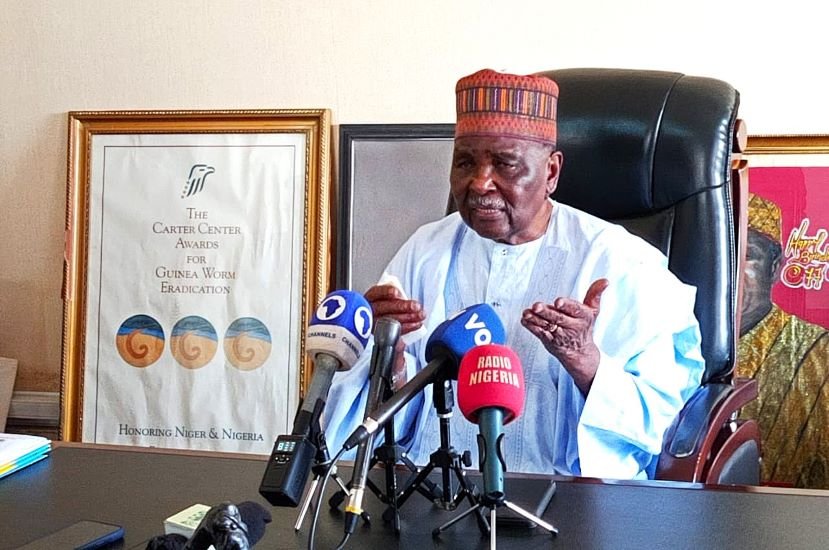Among the great men whose struggle led to the liberation of Nigeria and ensured the peace and unity of the country, General Yakubu Dan-Yumma Gowon stands out for his outstanding achievements.
Gowon led the country during one of the most difficult times in Nigeria’s history. As a 32-year-old military man, fate and history placed on his shoulders the important role of leading Nigeria as Head of State and Commander-in-Chief of the Armed Forces.
Mr. Gowon’s appointment as head of state came six years after Nigeria gained independence from Britain and following a military coup in 1966 that sparked a 30-month civil war.
This period tested General Gowon’s leadership qualities, political will, and can-do spirit. The conduct of the war and the policies developed by General Gowon’s government reflected his love of humanity and patriotism, especially his declaration that there would be “no winners or losers” after the civil war.
The Gowon administration’s reintegration, reconciliation and reconstruction program, 3-R, has the express purpose of ensuring the reintegration of the people of the separatist regions into Nigeria, the reconciliation of the Nigerian people, and the rebuilding of the country after the war. I had it.
The administration concluded these policies with the establishment of the National Youth Service Corps, NYSC program, on May 22, 1973. The program mobilized young Nigerians graduating from tertiary institutions to states outside the region to live with people of other ethnicities. Groups learn about their culture and contribute to the development of their communities. To this day, the NYSC remains one of General Gowon’s greatest legacies to Nigeria.
It was also during his administration that Nigeria’s national currency, the Naira, was introduced on January 1, 1973 by the post-independence colonial regime to replace Pound Sterling. Nigeria also changed its driving regulations from left-hand drive to right-hand drive under the Gowon administration.
An important element of the Gohara administration was infrastructure development.
General Gowon completed construction of Nigeria’s 960-megawatt Kainji Dam in 1968 and rebuilt the war-ravaged Niger Bridge at Onitsha on the east bank of the Niger River in Anambra state in the southeast.
The Gowon administration also launched the Second National Development Plan (1970-1974), which focused on improving living standards and strengthening infrastructure throughout Nigeria.
The regime similarly expanded the existing road network and established Unity Schools in 12 Nigerian states and the University of Benin in 1970.
In April 1975, the Gowon government established seven new universities, which were included in the second national development plan, and built some of them before being overthrown in 1976.
Nigeria’s economy recorded significant growth under the Gowon administration.
Nigeria’s membership in the Organization of the Petroleum Exporting Countries (OPEC) contributed to the impressive growth recorded in the physical and agricultural sectors during this period.
In the international arena, Nigeria maintained a policy of non-alignment. His government contributed human and material resources to the liberation movements of many African countries, particularly Zimbabwe and later South Africa.
General Gowon was one of the founders of the Economic Community of West African States, ECOWAS, which was established in 1973. His administration continued to cooperate with other African countries as a member of the Organization of African Union (OAU, now African Union, AU).
While attending the 1975 OAU summit in Addis Ababa, Ethiopia, he was ousted by military officers led by the late General Murtala Ramat Muhammad.
As literary icon Chinua Achebe wrote, Gowon’s superiority was not simply because his palm was crushed by a benevolent spirit. He took a tough path in life to achieve greatness and remained focused on his life’s ambitions.
Born on October 19, 1934 in Panxing, Plateau State, north-central Nigeria, Gowon began his early education in Zaria, present-day Kaduna State, northwestern Nigeria. His father, Nde Johanna, and mother, Matwok Kurunyan, were missionaries of the Church Missionary Society (CMS) and were transferred to Usasa, Zaria region at the time. Gowon continued his education at the Government College in Zaria and then received military training at the Royal Military Academy Sandhurst in England.
After being overthrown in 1975, General Gowon enrolled at the University of Warwick in England, where he earned a doctorate in political science. After his return to Nigeria, retired General Gowon started the “Nigeria Prays” movement as a way to demonstrate his unwavering dedication to Nigeria.
Critics say General Gowon ruled Nigeria during the oil boom, but his administration was profligate in resource management and reluctant to begin a transition program to hand over to an elected government. claims.
However, these criticisms pale in comparison to the noble achievements, especially in infrastructure development and maintaining Nigeria as one unified, peaceful and stable nation.
As Nigeria’s longest-serving head of state, General Yakubu Gowon, celebrates his 90th birthday, Voice of Nigeria celebrates the anniversary of this iconic monument whose selfless service and sacrifice to Nigeria remains a remarkable cornerstone. Celebrate the legend.
Congratulations, General Yakubu Gowon.
– Written by Cyril Okonkwo

